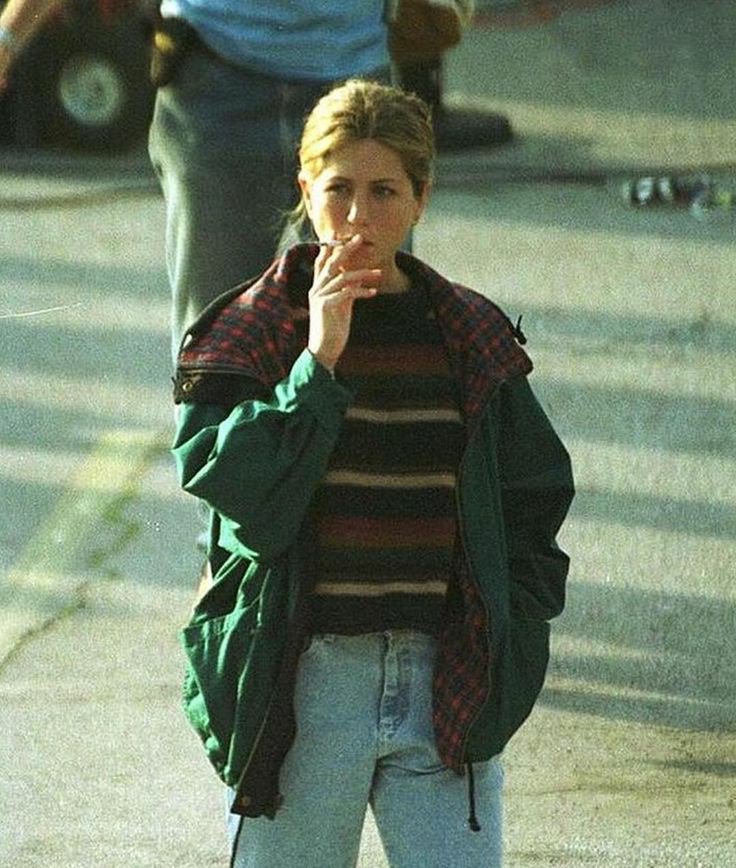In a revelation that has left fans both stunned and deeply moved, Jennifer Aniston has finally shared the real reason behind her long-kept decision to quit smoking — and it’s not what anyone expected.
The 55-year-old actress, beloved for her role as Rachel Green on Friends and admired for her ageless beauty and lifestyle discipline, had publicly stated years ago that she quit smoking and caffeine as part of a broader wellness overhaul. But in a new candid interview for the Mind & Balance podcast released this weekend, Aniston opened up about a lesser-known, highly personal motivation rooted in a psychological obsession that she says nearly consumed her.
A Wake-Up Call Through the Mirror

“I didn’t quit smoking for my health initially,” Aniston admitted. “I mean, yes, I knew it was bad for me. But that wasn’t enough. What made me stop was this thing I used to do — and I’ve never told anyone this publicly — where I would literally stare at myself in the mirror every night, obsessing over the tiny changes in my skin.”
The actress described what psychologists call “mirror checking,” a form of body dysmorphic behavior, where she would study the fine lines around her mouth and eyes, convinced she could see the toll of every cigarette.
“I became obsessed. It was almost ritualistic. I’d smoke, then go look in the mirror to see what it had ‘done.’ Every wrinkle, every pore — I thought it was a direct punishment,” she said.
This nightly routine, she says, became a form of psychological self-torment — one that fed a growing anxiety about aging, beauty, and control.

The Breaking Point
Aniston confessed that her mirror-checking spiraled during the final seasons of Friends, when the pressures of fame and constant close-ups on set began to affect her mentally.
“I’d come home from filming, take off all the makeup, and just stare. I would pinch the skin around my eyes, pull at my cheeks, telling myself, ‘You’re doing this to yourself. This is what that cigarette just cost you.’”
It wasn’t until a particularly intense moment — where she admitted breaking down in tears after a late-night “mirror session” — that she decided to seek help. A therapist helped her recognize that what she was experiencing bordered on obsessive-compulsive behavior.
“She looked me in the eyes and said, ‘Jennifer, you’re punishing yourself for something you can control. But you don’t have to do it this way.’ That hit me like a brick.”
A New Beginning
Within a week of that session, Aniston began a comprehensive quit-smoking program that included mindfulness, yoga, and cognitive behavioral therapy. “It wasn’t easy,” she said. “The withdrawal was brutal. But every time I craved a cigarette, I reminded myself: you’re healing not just your lungs, but your mind.”
Over time, she said the obsessive mirror-checking faded. “Now, I look at my face with gratitude, not judgment. That’s the biggest shift.”
Fans have reacted with overwhelming support, praising Aniston for her raw honesty and for bringing attention to the lesser-known psychological factors that often underlie addiction.
Celebrity Reactions
Celebrity friends and mental health advocates also chimed in after the podcast aired. Gwyneth Paltrow called Aniston’s story “brave and beautifully human,” while actor and addiction recovery activist Rob Lowe tweeted, “Jennifer’s truth is a reminder that we all have our battles — and healing takes more than willpower. It takes honesty.”
Mental health professionals are also applauding Aniston for shedding light on body dysmorphia in Hollywood, an industry often known for its pressure to maintain unrealistic standards.
“Her story illustrates how addiction and self-image can become entangled in ways most people don’t understand,” said Dr. Elena Thomas, a Beverly Hills-based therapist specializing in celebrity wellness. “This wasn’t vanity. It was a cry for control and clarity.”
What’s Next for Jenn?
Aniston, who recently signed on to co-produce a docuseries on aging in Hollywood, hinted that her next project might explore these very themes.
“We need to stop pretending that taking care of our mental health is something to whisper about,” she said. “We’re all looking in the mirror at something. And we all deserve to like what we see — not because it’s perfect, but because it’s real.”
For fans who have followed her from sitcom sweetheart to wellness icon, this moment of radical vulnerability might just be her most powerful role yet.



